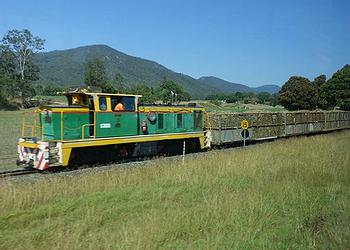
BRISBANE, Queensland, Australia, February 15, 2016 (ENS) – A Biofutures Industry Development Fund, intended to help first-movers in biofuels and the bioeconomy bridge the dreaded early stage funding gap that stands between them and implementation, was announced Friday by Queensland Premier Annastacia Palaszczuk (say Pala-shay).
Palaszczuk made the announcement following the second meeting of her Biofutures Cabinet Committee, the second held in Mackay,” reports the “Mackay Daily Mercury.”
“I’ve said it before and I’ll say it again,” Palaszczuk told the newspaper, “biofuels could have the same transformative effect on Queensland’s economy as the LNG industry, but it won’t happen without government commitment.”
She did not pin down a figure the would go into the fund initially, but the funding is likely to come from the $180 million Advance Queensland initiative.
To support the development and growth of a competitive biofuels and industrial biotechnology sector in Queensland, the government developed a Queensland Biofutures 10-Year Roadmap consultation paper. Public consultation closed on December 18, 2015.
With feedback on the consultation paper, the government now is preparing a Biofutures Roadmap Action Plan to grow the state’s biofuels and industrial biotechnology sector.

The new fund could very well be of direct benefit to the small city of Mackay north of Brisbane, nicknamed the sugar capital of Australia because its region produces more than a third of Australia’s cane sugar, a prime feedstock for biofuel.
The fund will further the objectives of the Liquid Fuel Supply (Ethanol and Other Biofuels Mandate) Amendment Bill 2015 – passed by the Queensland Parliament on December 1, 2015.
This law requires the fuel industry to meet targets for the sale of biobased petrol, such as E10 ethanol-blended petrol and biobased diesel for transportation fuels.
The mandate sets minimum sales proportions for both ethanol-blended regular unleaded petrol and also biobased diesel.
The biobased petrol mandate will apply separately from the bio-diesel mandate.
The government intends both to take effect on January 1, 2017.
The funding facility can be used to help cover the costs of due diligence processes so that investment-ready projects can access capital.
The government assured Queensland motorists in a February 10 statement that they will continue to have choice in the fuel market to purchase ethanol-blended petrol and other unleaded fuels to suit their engines.
The new ethanol mandate requires that three percent of regular unleaded petrol sales and ethanol blended fuel sales must be ethanol.
If a fueling station is selling 10 percent ethanol, E10, the most widely available ethanol blended fuel, under the new Liquid Fuel Supply law at least one in three litres of non-premium petrol sold at that station must be an E10 product.
The law provides that the ethanol mandate will increase to four percent from July 1, 2018), although the government has promised a review prior to any increase in either mandate.
The biobased diesel mandate requires 0.5 percent of all diesel fuel sold to be biobased diesel. This slightly exceeds current Queensland production capacity for biobased diesel.
Dr. Anthony Lynham, minister for state development and for natural resources and mines, says there has much interest in Queensland biofuels from airlines Qantas and Virgin and the U.S. Navy as well.
In January, the U.S. Navy launched its first carrier strike group powered partly by a beef fat-based biofuel.
At the University of Queensland (UQ), energy research covers second generation biofuel technologies such as the development of alcohol (methanol, butanol) fuel products from bio-electrochemical systems, green diesel from vegetable oil, micro-algal biofuel systems, and biohydrogen production.
Transgenic biofuel crops could be the result of genetic manipulation to improve efficiency of biofuel feedstocks.
UQ is developing feedstocks such as the legume tree Pongamia; eSorghum; a grass for arid environments; sugar, through the UQ-CSR SugarBooster program; and micro-algae in oil production for biodiesel.
Another focus is the engineering of green micro-algae as a source of biomass, biofuels, commodities and high value products.
This direction includes using green algal cells and advanced bio-reactor systems to produce bio-fuels such as hydrogen in a CO2-neutral process.
Additionally, microbial metabolic engineering of sugarcane is leading to new bioproducts from cells.
One of the University of Queensland’s stand out capabilities is in the area of new nanomaterials, so integral to the focus on clean energy production and utilisation.
UQ researchers are working toward the development of chemical routes for biomass conversion into valuable chemicals, transportation fuels, and clean hydrogen production.
Copyright Environment News Service (ENS) 2016. All rights reserved.
© 2016, Environment News Service. All rights reserved. Content may be quoted only with proper attribution and a direct link to the original article. Full reproduction is prohibited.
